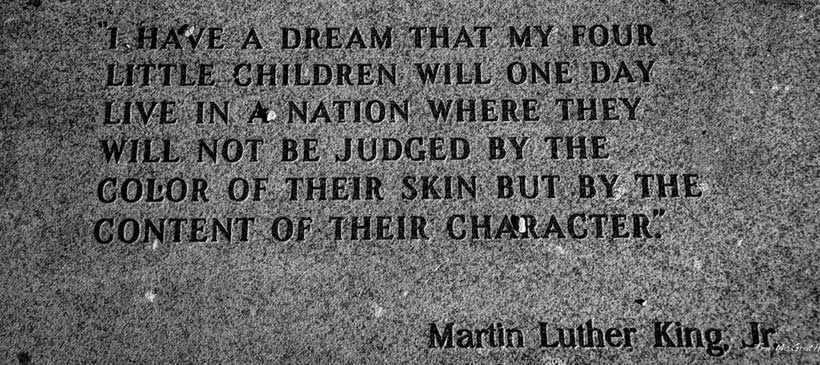
Alec F. Hickmott, a visiting lecturer in black studies and history, is teaching a course this semester on Martin Luther King Jr. Cross listed in both of his departments, the 200-level course is a deep dive into the life and times of the civil rights leader and his era. Here, on the 50th anniversary of King’s assassination on April 4, 1968, the professor explains why he’s teaching the course, and his students discuss their culminating research projects.
Visiting Lecturer Alec F. Hickmott
I wanted to teach a class on King for many reasons. The 50th anniversary of King’s assassination was of course important, but more than offering the class as commemoration I wanted to ask students to engage at a deeper, more critical level with King’s life and legacy. King is eminently quotable—perhaps too quotable—and I wanted to push students to return to both the source and the historical moment. There’s an obvious tension in framing a class about the history of the civil rights movement around its most important, male figurehead. It has the potential to obscure a range of issues, and particularly to minimize the vibrancy and diversity of grassroots black politics in the 1950s and 1960s. But my students’ research projects are wonderful at illuminating the ways King’s life and legacy was far broader than the narrow, stereotypical view we—and I think the broader American public—have of the man. They are exploring King’s global vision, his commitment to transforming urban communities outside the South, and the gendered contours of civil rights leadership. In that regard, I think the students’ research is an apt fulfillment of the work and life of Martin Luther King Jr.
Image
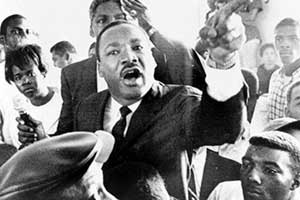
Daniel Delgado ’20
Major: Black studies

I am researching King’s presence in Los Angeles after the Watts Rebellion in August 1965. I am interested in knowing more about how King managed the outburst of violence and reconciled it with his nonviolent strategy to civil rights. I was drawn to this topic because we popularly conceive of King as someone who made his mark in Montgomery or Birmingham—or the American South more generally. Similarly, we commonly think of L.A. as a progressive, liberal city. The story of King in L.A. therefore complicates these popular conceptions and sheds light on a key moment that shaped the trajectory of the civil rights movement for years after.
Image
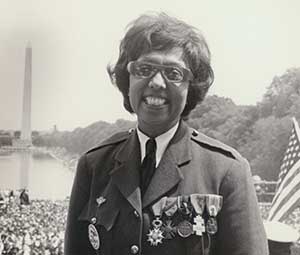
Melissa Laboriel ’18
Majors: Latinx and Latin American studies, sociology

My project is about Josephine Baker’s influence on the civil rights movement while being an African American expatriate living in Paris. I gained interest in this topic after seeing she had a close relationship with King and wrote him letters with advice about how to proceed with the movement. I want to explore her position as a black woman living abroad and how her unique perspective impacted King. I will also explore how she challenged the gender disparities within a movement that limited women’s involvement.
Image
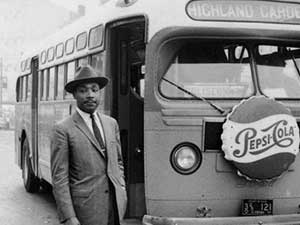
Melina Dominguez ’18
Majors: Political science, Latinx and Latin American studies

I am interested in how identities influence and dictate sociopolitical movements. With this project I wish to explore how black female leaders both navigated and counteracted the widespread sexism present in the civil rights movement. I am looking into how their racial identity as civil rights leaders might have been complicated by their gender identity. I am particularly curious about how this might have influenced the inner dynamics of the Montgomery Bus Boycott, which saw King and the Women’s Political Council as co-leaders. I hope to gain some insight into King’s own gender politics by looking into his interactions with these black female leaders.
Image
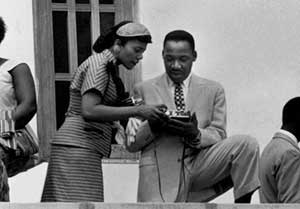
Avery Farmer ’20
Majors: Black studies, English

I am researching King’s trip to Ghana in 1957 to attend Ghana’s independence celebration and the inauguration of Kwame Nkrumah as its first prime minister. I was curious about the way that King often talks of Gandhian nonviolence in anti-colonial terms, and about his engagement with independence movements in other places, particularly movements that were less explicitly or intentionally nonviolent. It seemed to me that King’s choice to embrace the example of Gandhi in India over leaders of more violent movements was never well-defended in his writings, so I wanted to learn more about what he thought of theories of decolonization. This particular convergence of two leaders of freedom struggles, Nkrumah in Ghana and King in the United States, seemed like an appropriate place to investigate this question. Though Nkrumah was sympathetic to King’s thinking on nonviolence, Ghana’s independence may have been precipitated by instances of rioting, looting and outright violence. In my research, I investigate both the history of Ghanaian independence from the perspective of decolonization theory and the specifics of their meeting, with an attention to how King learned from it, talked about it and characterized it in the press and in his sermons.
Martin Luther King and Coretta Scott King in Ghana in 1957. Photo source
Image
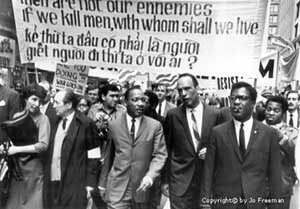
Maxwell Roche ’19
Majors: Computer science, mathematics

When we read about and discussed King’s public stance on the Vietnam War, I became immediately intrigued. I felt that it showed King’s dedication to the causes that he believed in, considering the backlash he received from many of his supporters. In addition, it attests to King’s intelligence by illuminating his knowledge in political and international affairs. I am studying King’s public stance against the Vietnam War and looking into what prompted him to take this public stance when he did.
Image

Jasmine Horan ’19
Major: Mathematics, statistics

My research focuses on King’s involvement with the U.S. presidential election of 1960. I am analyzing King’s stance on the candidates running for office and attempting to uncover the motivating factors behind these opinions. Although typically nonpartisan within the political realm, King is seen as an influential figure in this election in favor of JFK. Through various discussions in class, I was surprised to learn that King had not publicly favored any presidential candidate before 1960. I was drawn to this topic because I sought to uncover what changed for King; why, in this election, did he decide to support Kennedy and how did this decision impact the election?
Image
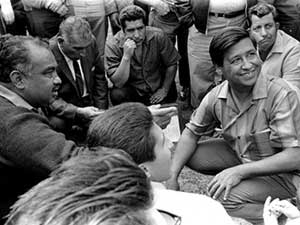
Latrell Broughton ’20
Major: Undeclared

My research looks into King’s relationship with non-black minority leaders, specifically Latinos. I arrived at this topic when I realized there was a gap in my understanding of King. I have historically understood King’s work and activism in terms of blackness and whiteness, so I wanted to use this course as an opportunity to expand my perception of him to include his work to unite other minority groups. Through my research, I have found that King most consistently worked with Latino leaders like Gilberto Gerena Valentin and Cesar Chavez, especially in his later years, while he was planning for his Poor People’s Campaign.
Image

Jenna Wyman ’21
Major: Undeclared

My interest in the Student Non-Violent Coordinating Committee (SNCC) as the subject for my research project started with the recent resurgence of student engagement in activism. The civil rights movement and the current fight for gun restriction have many aspects in common, an element that I highlight through this project. The power of students’ voices has been an important element of change throughout history, and the course of the civil rights movement changed with the introduction of student involvement. I focus on the formative years of SNCC as well as the founding role that Ella Baker played, because of her ability to see the potential of the student voice. I also explore how King eventually came to recognize the strength of youth groups and incorporated this into his strategy to change the history of this nation.
Image

Terrell Haughton ’20
Major: Undeclared

I came into the class late, after also considering Stats 111. I had never delved into the details and flow of the events of King’s life, and his role in the civil rights movement. I also knew little about how his personal beliefs changed as his life progressed. Towards the middle of the semester I became focused on how the civil rights movement progressed in urban areas, specifically Chicago. The more I learned, the more I grew interested in the progress made in implementing “open housing” for the black (and Hispanic) communities. King’s decision to move his family to one of these neighborhoods made me more interested in how this affected the social and political landscape. My project now centers on King’s effect on the Chicago legislature and in increasing awareness at the national level of issues facing urban society.
Martin Luther King, Jr. at Chicago Freedom Movement Rally, Soldier Field. Photo source
Image
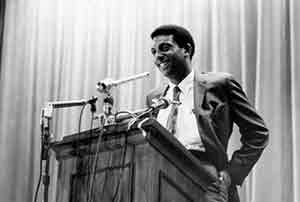
Wesley Guimaraes ’19
Major: Theater & dance

I am quite often attracted to performance, speeches, linguistic textures and sound. The study of the life and work of King involves all these elements and entails an extremely rich narrative on the history of the civil rights movement in this country. King’s early and late speeches are fascinating, but I was drawn to the 1966 speech by Stokely Carmichael at the March Against Fear. That speech pointed the spotlights at the concept of “Black Power,” a term that divided the leadership of the civil rights movement and forced King to engage in a deeply intellectual yet profoundly strategic journey to rejoin dissenting ends of the movement towards the advancement of his late political agenda. My research follows King’s transformation of a term that was antagonistic to his political philosophy into a powerful mechanism of nonviolent resistance.
Stokley Carmichael, 1967. Photo source